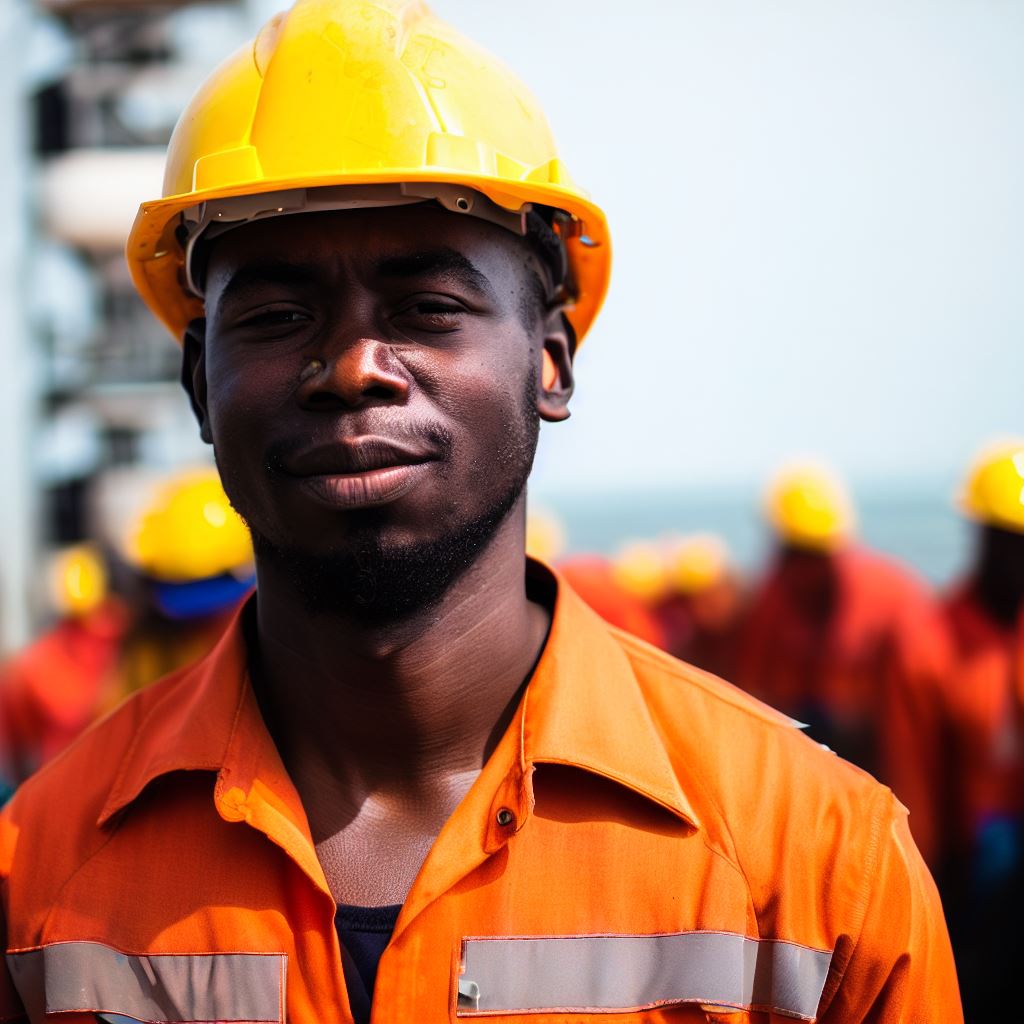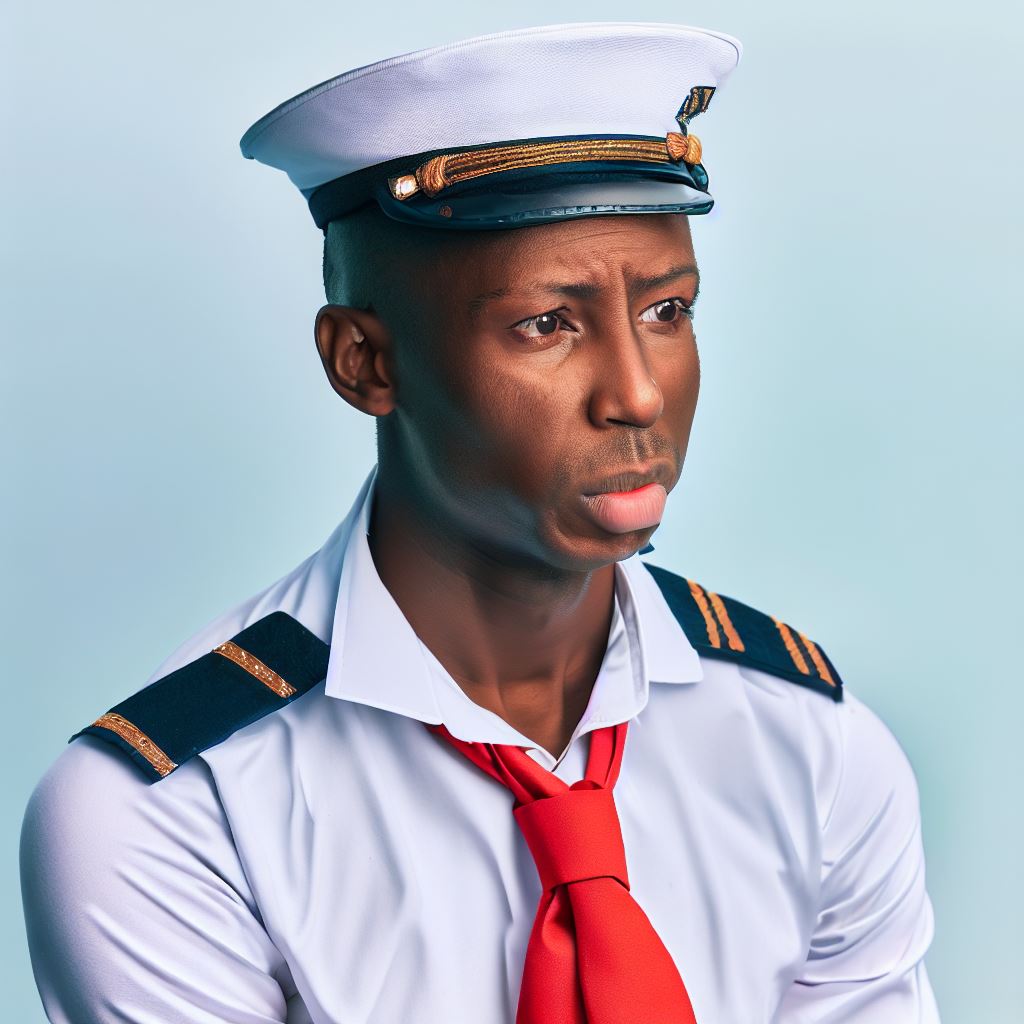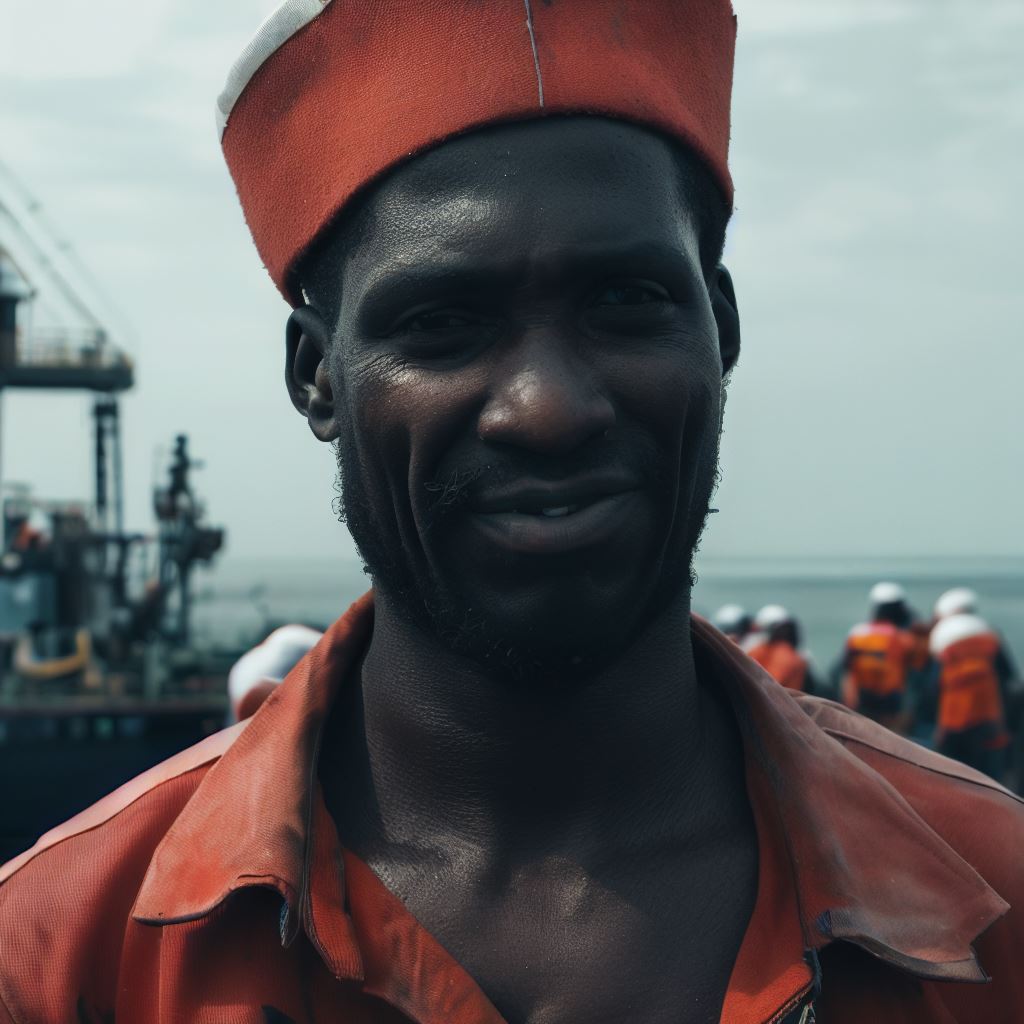Introduction
Recruitment and Training for Marine Oilers: Marine oilers play a crucial role in Nigeria’s maritime industry, ensuring smooth operations and maintenance of vessels.
The recruitment and training process for marine oilers in Nigeria involves screening, skill assessment, and rigorous training programs.
Importance of Marine Oilers in Nigeria
- Marine oilers play a vital role in ensuring the smooth operation of maritime vessels in Nigeria.
- Their work involves maintaining engines and machinery, contributing to the nation’s maritime industry.
Recruitment and Training for Marine Oilers
1. Recruitment Process:
- Prospective marine oilers often start as entry-level deckhands or engine room assistants.
- Relevant maritime certifications are typically required for entry.
1. Training Process:
- Training programs focus on engine maintenance, safety protocols, and vessel operations.
- Apprenticeships under experienced marine engineers provide hands-on experience.
- Ongoing training ensures proficiency in engine diagnostics, repair, and maintenance.
1. Certifications:
- To become a certified marine oiler in Nigeria, individuals must obtain the necessary STCW (Standards of Training, Certification, and Watchkeeping for Seafarers) certification.
- Continual learning and certification renewal are essential to stay up-to-date with industry standards.
Marine oilers are the unsung heroes of Nigeria’s maritime sector, ensuring vessels operate efficiently and safely.
The recruitment and training process equips them with the skills needed to excel in this crucial role, contributing to the nation’s maritime success.
Recruitment for Marine Oilers
Requirements and Qualifications for Marine Oiler Positions
- Valid seafarer’s medical certificate, including drug and alcohol tests.
- Basic training and certification in fire prevention, personal survival techniques, and first aid.
- Understanding of engine-room operations, including lubrication and maintenance.
- Knowledge of safety protocols and ability to follow instructions in emergency situations.
- Physical fitness and ability to work in challenging conditions for extended periods.
Recruitment Agencies and Methods Utilized in Nigeria
- Nigerian Maritime Administration and Safety Agency (NIMASA) collaborates with training institutions to recruit and train marine oilers.
- Certified Manning Agents provide recruitment services by connecting job seekers with shipping companies.
- Online job portals, social media platforms, and specialized maritime websites are used for job advertisements.
- Job fairs and networking events targeted at maritime professionals play a significant role in recruitment.
- NIMASA offers scholarships and sponsorships for aspiring marine oilers to boost recruitment.
Challenges and Opportunities in Recruiting Marine Oilers
Challenges
- Shortage of qualified candidates due to lack of awareness and misconceptions about the profession.
- Inadequate training facilities and limited access to advanced technology.
- Low wages and long working hours discourage potential candidates.
- Competition from international maritime markets for skilled marine oilers.
- Difficulties in retaining qualified personnel due to attractive offers from other industries.
Opportunities
- Increasing demand for marine oilers due to the growth of the global shipping industry.
- Promotion of Nigeria’s maritime sector through government initiatives and policies.
- Investments in training institutions and improvement of educational programs.
- Collaboration between industry stakeholders to enhance recruitment efforts and share best practices.
- Advancements in technology leading to improved working conditions and increased efficiency.
Recruiting qualified marine oilers in Nigeria is crucial to meet the demands of the growing maritime industry.
These professionals play a vital role in ensuring the smooth operation and maintenance of marine vessels, which is essential for the transportation of goods and global trade.
To qualify for marine oiler positions, several requirements and qualifications must be met.
These include holding a valid seafarer’s medical certificate, passing drug and alcohol tests, and completing basic training in fire prevention, personal survival techniques, and first aid.
Additionally, candidates should possess knowledge of engine-room operations, safety protocols, and physical fitness to handle the demanding nature of the job.
In Nigeria, various recruitment agencies and methods are utilized to source and connect potential marine oilers with shipping companies.
The Nigerian Maritime Administration and Safety Agency (NIMASA)
collaborates with training institutions to identify and train suitable candidates.
Certified Manning Agents also play a crucial role as intermediaries between job seekers and companies, ensuring a smooth recruitment process.
In today’s digital world, online job portals, social media platforms, and specialized maritime websites are increasingly utilized for job advertisements in the maritime sector.
Furthermore, job fairs and networking events dedicated to maritime professionals provide opportunities for direct interaction and recruitment.
However, Recruitment and Training for Marine Oilers in Nigeria faces several challenges. First, there is a shortage of qualified candidates due to the lack of awareness and misconceptions about the profession.
Second, inadequate training facilities and limited access to advanced technology hinder the development of skilled marine oilers.
Additionally, low wages and long working hours discourage potential candidates from pursuing a career as marine oilers.
Lastly, retaining qualified personnel becomes a challenge when other industries present more enticing opportunities.
Read: Safety Protocols for Marine Oilers in Nigeria: A Guide
Training for Marine Oilers
Necessary Skills and Knowledge for Marine Oilers
- Physical fitness, mechanical aptitude, and good communication skills are essential for marine oilers.
- They must have a strong understanding of engine systems, safety regulations, and emergency procedures.
- Basic knowledge of maintenance, repair, and troubleshooting of marine machinery is also required.
- Marine oilers should possess teamwork skills and the ability to work effectively under pressure.
- Strong problem-solving skills, attention to detail, and the ability to follow instructions are crucial.
Training Programs and Institutions in Nigeria
- Nigeria Maritime University (NMU) offers training programs specifically designed for marine oilers.
- The Maritime Academy of Nigeria (MAN) provides comprehensive training courses for aspiring marine oilers.
- Several private maritime training institutions in Nigeria offer specialized programs for marine oilers.
- These institutions provide hands-on practical training and theoretical knowledge to develop maritime skills.
- Training programs focus on engine operations, safety procedures, maintenance, and environmental regulations.
Specific Courses and Certifications for Marine Oilers
- Marine engineering courses cover topics such as marine auxiliary machinery, lubrication systems, and fuel management.
- Basic safety training (BST) courses ensure knowledge of firefighting, first aid, personal survival, and social responsibilities.
- Proficiency in survival craft and rescue boats (PSCRB) certification is necessary for marine oilers.
- Other essential certifications include engine room resource management (ERM) and security awareness training (SAT).
- Additional courses cover topics like electrical systems, propulsion, pollution prevention, and watchkeeping duties.
Challenges and Improvements in the Training System
- Insufficient funding and limited resources pose challenges to the development of a robust training system.
- There is a need for better collaboration between training institutions and industry stakeholders.
- Continuous evaluation and updates of training programs are necessary to keep up with modern advancements.
- Enhanced practical training facilities and equipment can greatly benefit the learning experience of marine oilers.
- Efforts to bridge the gap between theoretical knowledge and practical skills should be a priority
Marine oilers in Nigeria require a range of skills and knowledge to effectively perform their duties.
Training programs offered by institutions like the Nigeria Maritime University and the Maritime Academy of Nigeria equip aspiring oilers with the required expertise.
Specific courses and certifications covering various aspects of marine engineering and safety are essential in their training.
However, the training system faces challenges such as limited resources and the need for better industry collaboration.
Improvement in practical training facilities and continuous evaluation of programs are necessary to enhance the training experience and ensure the competence of marine oilers in Nigeria.
Read: The Impact of Technology on Sailors in Nigeria’s Navy

Uncover the Details: Understanding the Role of a Logistician in Nigeria’s Economy
Job Prospects and Career Path
Job Prospects and Opportunities for Marine Oilers in Nigeria
- Marine oilers in Nigeria have a promising job market with ample opportunities.
- The country’s maritime industry is growing, creating a constant demand for skilled marine oilers.
- Oil and gas companies, shipping lines, and offshore drilling rigs require marine oilers.
- Marine oilers can seek employment in both the private and public sectors.
- With Nigeria’s vast coastline, there are various ports and offshore locations where marine oilers can work.
- The oil and gas industry in Nigeria contributes significantly to the demand for marine oilers.
- Marine oilers can find job prospects not only on vessels but also in oil terminals and refineries.
Potential Career Path and Advancement Opportunities
- Marine oilers can start their careers as entry-level positions on ships or offshore platforms.
- With experience and additional training, they can progress to higher-ranking positions.
- Advancement opportunities for marine oilers include becoming an engine room operator or motorman.
- They can also specialize in specific areas like maintenance, logistics, or safety management.
- Obtaining certifications and attending professional development courses can further enhance career prospects.
- Marine oilers can aim for leadership roles such as chief engineer or maritime superintendent.
- There are also opportunities for marine oilers to step into shore-based managerial positions.
Responsibilities and Duties of Marine Oilers in Their Careers
- Marine oilers are responsible for operating and maintaining machinery and equipment onboard.
- They ensure the safe and efficient running of the vessel’s mechanical systems.
- Performing regular engine room checks and maintenance tasks is a crucial duty of marine oilers.
- They assist the engineering department in repairs, inspections, and troubleshooting procedures.
- Marine oilers may also handle the loading, storage, and transfer of fuel, oil, and other supplies.
- They participate in emergency drills and are trained to respond to fires, floods, and other incidents.
- Proper record-keeping, documentation, and adherence to safety protocols are essential responsibilities.
By offering favorable job prospects, a promising career path, and important responsibilities, the field of marine oilers in Nigeria provides exciting opportunities for individuals looking to enter or advance in the maritime industry.
Read: Women in Nigeria’s Maritime Industry: Sailors and Oilers
Importance of Maritime Safety and Regulations
The significance of safety measures and regulations for marine oilers
- Safety measures and regulations ensure the protection of marine oilers’ lives and well-being.
- They also safeguard the integrity and functionality of the vessels they work on.
- Adhering to safety measures reduces the risk of accidents, injuries, and environmental degradation.
- Regulations promote a culture of safety and accountability within the maritime industry.
- They contribute to the overall effectiveness and efficiency of maritime operations.
- By implementing safety measures, the industry gains a positive reputation and attracts skilled professionals.
- Compliance with regulations enhances the teamwork and coordination among marine oilers.
- Strict adherence to safety measures ensures a conducive and secure working environment.
- Well-defined safety protocols minimize the likelihood of equipment failure or malfunction.
- Regulations also encourage continuous improvement, innovation, and the adoption of best practices.
The role of maritime authorities in ensuring safety and security
- Maritime authorities set and enforce safety standards and regulations to protect marine oilers.
- They conduct regular inspections to verify compliance with safety measures and regulations.
- Authorities establish emergency response plans to address potential incidents and protect lives at sea.
- Agencies collaborate with international organizations to develop standardized safety procedures.
- Maritime authorities provide training and certifications to enhance the skills of marine oilers.
- They investigate accidents and incidents to identify causes and prevent future occurrences.
- Through regulatory frameworks, authorities ensure the proper maintenance of vessels and equipment.
- Maritime agencies promote safety awareness campaigns to educate marine oilers and raise safety consciousness.
- They collaborate with industry stakeholders to address emerging safety concerns and implement effective solutions.
- Authorities continuously review and revise safety regulations to keep pace with industry advancements.
The importance of compliance with international standards and regulations
- Compliance with international standards ensures harmonization and consistency across the maritime industry.
- It facilitates smooth operations and seamless cooperation between vessels and ports worldwide.
- Following international regulations fosters cross-border trade and promotes global maritime connectivity.
- Compliant maritime operations prevent delays, penalties, and restrictions when entering foreign ports.
- Adhering to international standards enhances the reputation and competitiveness of the Nigerian maritime industry.
Maritime safety and regulations are of paramount importance in ensuring the well-being of marine oilers, the integrity of vessels, and the protection of the environment.
Compliance with international standards and regulations, as enforced by maritime authorities, plays a vital role in maintaining safety, security, and operational efficiency in the Nigerian maritime industry.
Read: Maritime Schools in Nigeria: Preparing Tomorrow’s Sailors
See Related Content: Challenges and Opportunities in Nigeria’s Travel Sector
Gain More Insights: A Guide to Truck Loading Jobs in Nigeria’s Oil Industry
Conclusion
A successful marine oiler industry in Nigeria heavily relies on effective recruitment and training strategies.
Recruitment and training play a crucial role in enhancing the skills and competencies of marine oilers.
By summarizing the key points discussed in this blog post, it is evident that:
- The demand for marine oilers in Nigeria is increasing, creating vast employment opportunities in the industry.
- Recruitment processes must prioritize qualified and skilled individuals to ensure safe and efficient oiler operations.
- Training programs should cover essential maritime knowledge, safety protocols, and teamwork skills.
- Continuous learning and development opportunities are crucial to keep up with evolving technologies and industry standards.
It is essential to emphasize the importance of recruitment and training in enhancing the marine oiler industry in Nigeria.
Investing in the right individuals and providing them with proper training increases the industry’s efficiency, productivity, and safety.
Therefore, individuals interested in pursuing a career as a marine oiler should actively seek necessary qualifications and training opportunities.
By obtaining the required certifications and skills, aspiring marine oilers can enhance their employability and contribute to the industry’s growth.
The marine oiler industry in Nigeria holds significant potential, and with proper recruitment and training, it can flourish and benefit both individuals and the nation.




